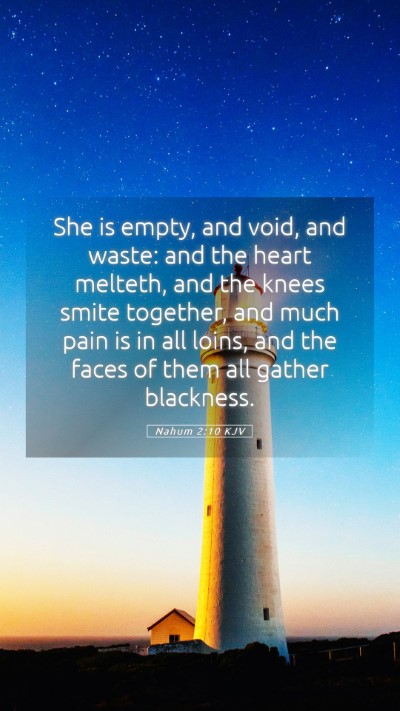Old Testament
Genesis Exodus Leviticus Numbers Deuteronomy Joshua Judges Ruth 1 Samuel 2 Samuel 1 Kings 2 Kings 1 Chronicles 2 Chronicles Ezra Nehemiah Esther Job Psalms Proverbs Ecclesiastes Song of Solomon Isaiah Jeremiah Lamentations Ezekiel Daniel Hosea Joel Amos Obadiah Jonah Micah Nahum Habakkuk Zephaniah Haggai Zechariah MalachiNahum 2:10 Meaning
What is the meaning of Nahum 2:10?
She is empty, and void, and waste: and the heart melteth, and the knees smite together, and much pain is in all loins, and the faces of them all gather blackness.
Nahum 2:10 Bible Verse Meaning
Nahum 2:10 - Understanding the Biblical Message
Bible Verse: Nahum 2:10
Verse Text: "She is empty, and void, and waste: and the heart melteth, and the knees smite together, and much pain is in all loins, and the faces of them all gather blackness."
Overview
Nahum 2:10 presents a vivid portrayal of the devastation that follows judgment. The prophet Nahum delivers this message primarily against Nineveh, emphasizing the totality of its destruction.
Bible Verse Meanings
This verse describes the aftermath of divine judgment striking the proud city of Nineveh. Biblical commentators provide insights into the implications of being "empty, void, and waste." Each element signifies the thoroughness of God’s retribution.
Matthew Henry's Commentary
Henry emphasizes the use of the terms "empty" and "void" to describe the consequences of divine wrath. The desolation of Nineveh is portrayed as complete, reflecting how swiftly the powerful can fall. The emotional response of those remaining illustrates fear and terror, signifying the impact of God's judgment on the hearts of men.
Albert Barnes' Commentary
Barnes notes that the vision of calamity includes vivid imagery of physical reactions—melting hearts and trembling knees. This suggests that even the strongest warriors would experience terror at the sight of impending doom. Barnes relates this to the idea that God's judgments bring not only destruction but also fear and anguish among those who are aware of their fate.
Adam Clarke's Commentary
Clarke elaborates on the metaphorical language used in this verse. He observes that "the faces gather blackness" signifies despair or shame. This cultural expression signifies a profound sense of hopelessness in the face of judgment and destruction. Clarke also emphasizes the emotional and physical toll of impending calamity on both the city and its inhabitants.
Biblical Exegesis
In understanding Scripture such as Nahum 2:10, it is relevant to consider the greater historical context of Nineveh, a city known for its oppression and sin against Israel. The prophecy serves not only as a warning to Nineveh but also as an assurance to Israel of God's ultimate justice.
Scripture Analysis
- Divine Judgment: The verse illustrates the repercussions of turning away from God and highlights the certainty of judgment against unrepentant nations.
- Emotional Response: The reactions described symbolize the fear that grips people when confronted with their mortality and the reality of consequences.
- God’s Sovereignty: This verse reinforces the understanding that God is in control of nations and their destinies.
Application of Bible Verses
Believers can apply the lessons from Nahum 2:10 by recognizing the importance of repentance and the serious nature of sin. It serves as a reminder that while judgment may seem distant, it is imminent for those who turn away from righteousness.
Cross References
- Jeremiah 50:13: "Because of the wrath of the Lord it shall not be inhabited..." - speaks to the desolation of cities under judgment.
- Ezekiel 30:3: "For the day is near, the day of the Lord is near..." - a call to heed God's approaching judgment.
- Isaiah 24:10: "The city of confusion is broken down..." - parallels the destruction themes in Nahum.
- Revelation 14:10: "...the smoke of their torment ascends forever and ever..." - illustrates the eternal consequences of rejecting God.
Conclusion
In summation, Nahum 2:10 serves as a stark reminder of the consequences that follow divine judgment. For those seeking Bible study insights, understanding the emotional and physical reactions detailed in this passage allows for a deeper comprehension of God's justice and the significance of repentance. Embracing the meaning of this verse enhances our overall understanding of Scripture and prepares us to address similar themes in our lives today.


